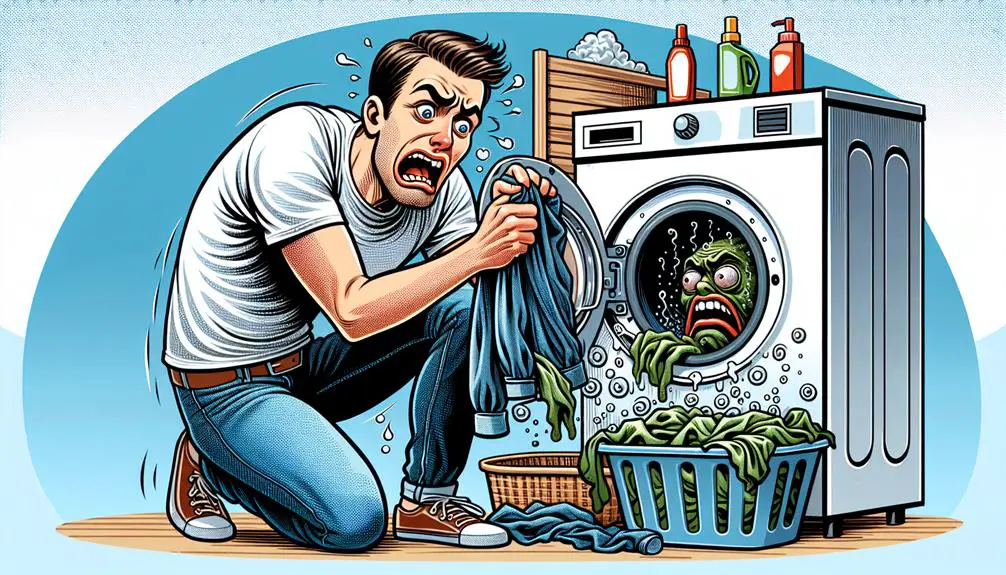Ever wondered why, despite my best efforts, my clothes still emit a musty odor after drying?
It can be frustrating to pull out supposedly clean garments only to be greeted by an unpleasant scent. But fear not, as there are several factors that could be causing this issue.
From trapped moisture to hidden bacteria, the reasons might surprise you. Let's uncover the mysteries behind these lingering odors and discover effective solutions to ensure our clothes smell fresh and clean every time.
Table of Contents
Key Takeaways
- Trapped moisture and inadequate ventilation in the dryer can cause lingering odors on clothes.
- Excess detergent residue interacting with sweat and body oils leads to unpleasant smells post-drying.
- Proper rinsing and ventilation are crucial to prevent odor-causing residue buildup.
- Regular dryer maintenance, including cleaning components and using natural deodorizers, helps eliminate lingering odors.
Common Causes of Lingering Odors
Trapped moisture and inadequate ventilation during the drying process often lead to lingering odors in clothes. Moisture build-up in the dryer, especially when coupled with warm temperatures, creates the perfect environment for mold and mildew to thrive. These microorganisms can cause musty smells to permeate the fabric, resulting in unpleasant odors that seem impossible to remove.
One crucial step to prevent such odors is to regularly clean the lint trap. A clogged lint trap restricts airflow in the dryer, allowing moisture and odors to linger in the machine and transfer onto the clothes during the drying cycle. Additionally, ensuring proper ventilation in the laundry area can help prevent moisture from accumulating in the dryer and on the clothes.
Therefore, to combat lingering odors in clothes, it's essential to address issues like moisture build-up, mold and mildew growth, and the importance of cleaning the lint trap regularly to maintain fresh-smelling laundry.
Impact of Detergent Residue
I've noticed that detergent residue is a major player in the game of clothes smelling funky post-drying. When excess detergent builds up on fabrics, it can trap unpleasant odors and even bacteria, creating a musty smell that lingers.
It's crucial to be mindful of the amount of detergent we use and ensure proper rinsing to prevent this issue.
Detergent Residue Buildup
When laundering clothes, the impact of detergent residue buildup on fabrics can't be underestimated, as it can lead to persistent musty odors even after drying. Residual detergent left on clothes can trap bacteria and mold, resulting in unpleasant musty odors. This residue may also interact with body oils and sweat, intensifying the foul smell during the drying process.
Inadequate rinsing of laundry detergent can leave behind residue that contributes to lingering odors in dried clothes. Excessive detergent usage can lead to a buildup on fabrics, causing a musty odor post-drying. Additionally, residual detergent can attract dirt and grime, further enhancing the stinky odor in clothes once they've been dried.
Proper rinsing and appropriate detergent amounts are crucial to avoid these issues.
Lingering Odor Problem
After discussing the impact of detergent residue buildup on clothes post-drying, it becomes evident that addressing the lingering odor problem caused by this residue is essential for maintaining fresh-smelling laundry.
Residual detergent left on garments can attract and trap bacteria and odors in the fabric fibers, leading to a persistent unpleasant smell. This buildup of residual detergent, especially when combined with body oils and sweat, contributes to the foul odor issue. Improper rinsing or using an excessive amount of detergent can result in a soapy film that exacerbates the odor problem. Additionally, this residue can mix with lint, further intensifying the lingering smell concern.
To combat this, proper washing techniques and adequate rinsing are crucial to prevent the buildup of residual detergent and ensure your clothes smell clean and fresh.
Residual Washing Chemicals
Excess detergent residue remaining on garments post-washing can lead to persistent unpleasant odors that linger even after drying. When laundry detergent or fabric softener isn't thoroughly rinsed out, the residual chemicals can mix with sweat and body oils, creating a sour or musty smell in clothes.
This buildup of detergent residue, especially from using too much detergent or not rinsing properly, contributes to the lingering odor problem. Additionally, fabric softeners and scent boosters, if not properly dispensed or rinsed, can also leave behind residues that interact with body odors, intensifying the post-drying smells.
To combat this issue, ensuring proper rinsing in the washing machine and using the correct amount of laundry products can help prevent the buildup of detergent residue and keep clothes smelling fresh after drying.
Overloading the Dryer
I've found that cramming too many clothes into the dryer can block airflow, making it harder for my laundry to dry properly.
Not only does this lead to longer drying times, but it can also result in musty odors lingering on my clothes.
To avoid these issues, I've learned that giving my laundry some breathing room in the dryer is key to ensuring they come out fresh and dry every time.
Too Many Clothes
How can overloading the dryer with too many clothes affect the efficiency of drying and lead to musty odors? When you stuff the dryer beyond its capacity, airflow is restricted, hindering the drying process and causing unpleasant smells. Here are some key points to consider:
- Reduced airflow due to overloading prevents proper circulation of hot air, resulting in dampness and odors.
- Clothes need space to move freely in the dryer to dry evenly and avoid clumping.
- Overloading can cause clothes to stick together, creating pockets where moisture and odors get trapped.
- Adequate spacing between garments allows for better air circulation, reducing the chances of musty smells post-drying.
Avoid overloading your dryer to ensure your clothes come out fresh and dry every time.
Air Circulation Blocked
Overloading the dryer with too many clothes not only hampers the drying efficiency but also blocks adequate air circulation, leading to musty odors in the laundry. When the dryer is packed full, air circulation is restricted, causing dampness to linger in the fabrics. This trapped moisture creates an ideal environment for bacteria and mildew to thrive, resulting in unpleasant smells on your clothes.
Moreover, overloading the dryer can lead to an accumulation of lint in the machine, further impeding proper airflow. To prevent these issues, it's crucial to leave enough space in the dryer for clothes to tumble freely, allowing hot air to circulate evenly and dry your laundry thoroughly. Avoid overloading to ensure efficient drying and keep your clothes smelling fresh.
Longer Drying Time
Avoiding overloading the dryer can significantly reduce the drying time for your clothes, ensuring they come out fresh and free of musty odors. Here are some essential points to consider:
- Proper Spacing: Clothes need room to tumble and dry effectively, so avoid cramming too many items into the dryer at once.
- Airflow: Proper airflow is crucial for efficient drying, and overloading can impede air circulation, leading to longer drying times and potential musty smells.
- Balanced Load: Ensure a balanced load in the dryer to prevent clothes from clumping together, which can hinder drying efficiency.
- Follow Capacity Guidelines: By adhering to the recommended capacity guidelines for your dryer, you can prevent clothes from smelling bad after drying.
Insufficient Air Circulation
When air circulation in the dryer is insufficient, clothes may retain moisture, leading to a damp and musty smell. Inadequate airflow prevents proper drying, creating a breeding ground for bacteria and mold in the damp environment, contributing to the unpleasant odor.
Clothes that haven't dried completely due to poor air circulation can end up with a lingering musty smell even after the drying cycle. The lack of ventilation in the drying area also plays a role in clothes holding onto moisture, resulting in that damp smell post-drying.
To combat this issue, it's crucial to enhance air circulation within the dryer by ensuring adequate ventilation. By improving airflow and allowing clothes to dry thoroughly, you can help prevent the development of that unwelcome musty smell in your laundry. It's essential to address air circulation problems to keep your clothes smelling fresh and clean after each drying cycle.
Mold and Mildew Development
Developing in damp clothes left in the dryer, mold and mildew can cause a musty smell. Here are four key points to consider regarding mold and mildew development in your laundry:
- Moisture Matters: Excessive moisture in the dryer creates a breeding ground for mold on fabrics, leading to unpleasant odors.
- Ventilation Is Vital: Improper ventilation in the laundry area can contribute to mold and mildew formation on dried clothes, exacerbating the issue.
- Timing is Crucial: Leaving wet clothes in the dryer for extended periods can further promote mold growth, resulting in a persistent musty smell.
- Machine Maintenance: Mold growth in high-efficiency washing machines can transfer musty odors to clothes during drying cycles, highlighting the importance of regular cleaning and maintenance to prevent mold and mildew development.
Understanding how mold and mildew thrive in environments with excessive moisture is essential to combatting musty odors in your laundry. Proper care and attention to drying times and machine maintenance can help prevent these issues.
Not Cleaning the Dryer Properly
To maintain fresh-smelling clothes after drying, it is crucial to regularly clean all parts of the dryer, including the lint trap, vents, drum, and door seals. Neglecting these areas can lead to musty odors in your clothes. Here is a table outlining the key components that need regular cleaning to avoid unpleasant smells:
| Dryer Component | Importance of Cleaning | Consequences of Neglect |
|---|---|---|
| Lint Filter | Prevents lint buildup | Musty odor in clothes |
| Dryer Vent | Ensures proper airflow | Damp smell in clothes |
| Drum | Avoids odor transfer | Lingering odors on clothes |
| Door Seals | Prevents mold growth | Foul smell in clothes |
Regular maintenance of these components is essential to keep your dryer running efficiently and your clothes smelling fresh. Make sure to clean them periodically to avoid the buildup of lint and mold that can cause unwanted odors in your laundry.
Using the Wrong Dryer Settings
Improper selection of dryer settings can lead to lingering odors in clothes post-drying. When it comes to the right dryer settings, precision is key to ensuring your clothes come out fresh and clean. Here are some crucial points to consider:
- Match Dryer Settings to Fabric Types:
Selecting the appropriate setting for different fabric types is vital to prevent odors. For instance, using high heat on delicate fabrics can cause them to retain unpleasant smells.
- Avoid Overloading the Dryer:
Overloading the dryer can hinder proper airflow, resulting in clothes not drying evenly. This uneven drying process can contribute to odors lingering in your garments.
- Set the Correct Drying Time:
Incorrectly setting the drying time may lead to clothes not drying thoroughly. Incomplete drying can leave behind a musty smell that's hard to get rid of.
- Choose the Right Cycle:
Using the wrong dryer cycle for specific fabric types can also be a culprit behind stubborn odors. Make sure to match the cycle with the fabric to maintain freshness in your clothes.
Tips for Eliminating Odors
To freshen up clothes and eliminate stubborn odors, consider incorporating simple household items and effective techniques into your laundry routine. Here are some tips to help you combat dryer smells, remove mold, and infuse your clothes with pleasant scents:
| Tip | Description |
|---|---|
| Use White Vinegar in Rinse Cycle | White vinegar helps eliminate odors by breaking down the compounds causing the smell. |
| Add Baking Soda to Wash Cycle | Baking soda is a natural deodorizer that can neutralize odors and freshen up your clothes. |
| Use Wool Dryer Balls with Essential Oils | Infuse your laundry with pleasant scents by adding essential oils to wool dryer balls. |
Frequently Asked Questions
How Do You Get the Smell Out of Clothes After Drying?
To get that smell out of clothes after drying, I use white vinegar in the rinse cycle or add baking soda to the wash. Hanging them outside to air out or spritzing with water and essential oils works wonders too.
How Do I Stop My Clothes From Smelling in the Dryer?
To stop clothes from smelling in the dryer, I clean the lint trap, ensure clothes are fully dry before removing, use dryer balls with oils, inspect/clean the vent, and add vinegar or baking soda during drying.
How Do You Make Your Clothes Smell Good After Drying?
I make my clothes smell good after drying by adding a few drops of lavender essential oil to a damp washcloth in the dryer. It leaves them with a lovely scent that lingers, making every wear a delight.
Why Does My Laundry Smell Sour After Drying?
I've noticed a sour smell lingering on my clothes post-drying. Trapped moisture, bacteria growth, poor ventilation, detergent residue, or inadequate airflow in the dryer might be the culprits. I need to address these issues promptly.
- Recycling Nonwoven Fabrics: Is It Possible? - July 11, 2025
- Recycling Nonwoven Fabrics: Is It Possible? - July 11, 2025
- Recycling Nonwoven Fabrics: Is It Possible? - July 11, 2025







